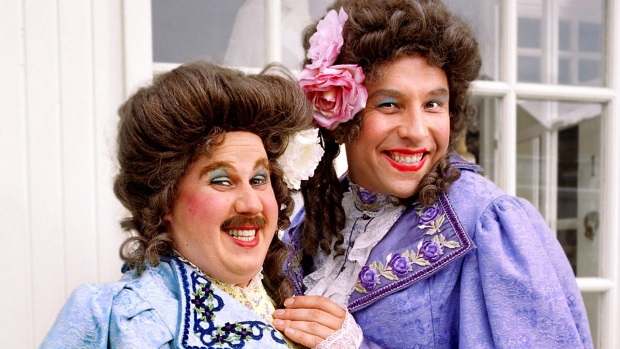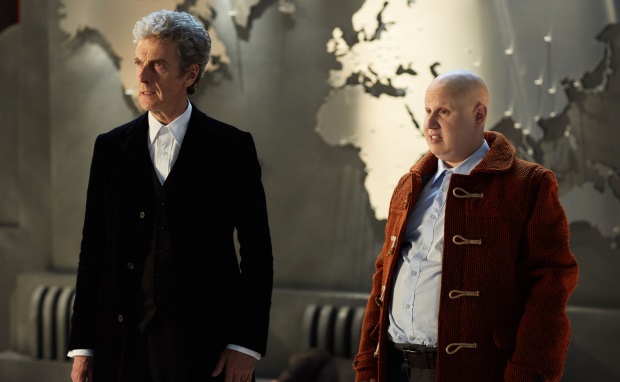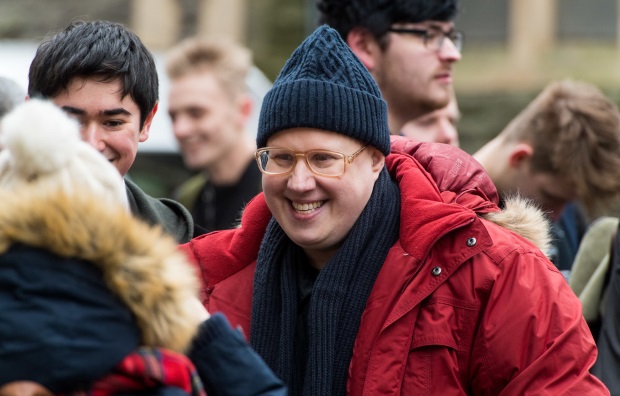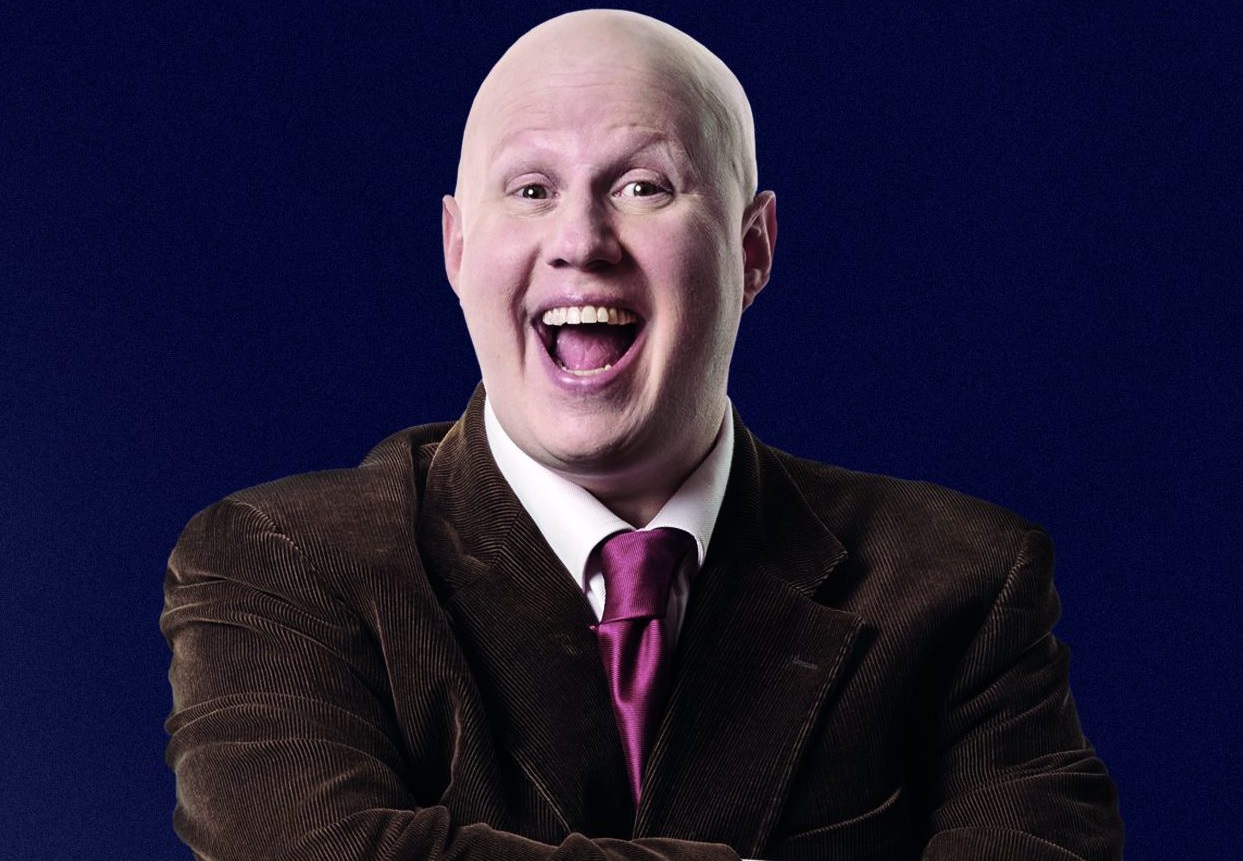Matt Lucas was on his way to Yeovil when we caught up with him for a chat. He’s been promoting his excellent memoir Little Me, and he spared us half an hour for a natter that covered Doctor Who, Little Britain, his book, grief, mental health, hair, a Twix bar in the fridge and Les Mis.
The chat went like this…
It’s a really good book you’ve written, appreciating that sounds like insincere waffle, but it’s genuinely true. My question whenever anyone has written such a personal book is why, and why now?
Two things. One was I like to keep busy, and when I was signed up to do Doctor Who, I thought that they’ll probably only want me to do three episodes, because that’s what they signed me up to do.
And then I thought I’ll have this gap, that I’ll only be in it for five minutes or so, because that’s how I’d done The Husbands Of River Song. So then I thought I’ll probably have a bit of time, might be good to fill it with something. I was working on a TV pilot at the time, and was still waiting to see what would happen with that. Also, I thought it was be good to clear some space in my head. I’m 43, and I thought my head is full of my life, and I could use some space so I could do new things.
Also I thought it’d probably be good to write about stuff while I could still remember it. Those were the reasons.
Did the clearing your head bit work?
As of now… I was writing the book and writing the book. Then I went onto a writing job for a little bit on a friend’s TV series. Then there was all the promo for the book, which is what’s currently happening. So I’m still in book mode! I finished it, there was the proofreading and photos, then it went to press very quickly, and I started doing promo work I haven’t yet had time to think about anything other than the book! I’m doing this for about another ten days, then I get six weeks off, and then I’m back in the UK in December. And in those six weeks I’ll find out if my head’s clear, and if I still have anything to say!
You say you wanted to capture a lot of things whilst there in your head. It struck me reading the book that you seem to have led three, four, five different lives by the time you’ve got to 43. Just one life would have been testing enough.
I love the firm moral core at the heart of your book, and you’re up front about what you won’t talk about. Can you talk through that for those who haven’t seen the book yet, and was there pressure to go another way, from yourself or someone else?
No, because I think ultimately, everyone has had bad experiences. Everyone in their life can look at things and go I could have done that differently. And they can also say I wish that person had treated me better. Everyone has that.
But it’s what you do with that, and whether you turn that into negative energy or positive energy. There are people and experiences I could have written about, definitely. I can think of three, straight off the bat, as I talk to you now. But there are some people I think oh, I wish they’d treated me better. But I don’t know what was going on in their lives at the time for a start.
Also, any autobiography that you’ve ever read and enjoyed, that didn’t throw people under the bus, there definitely were people to throw under the bus, but the writer made a choice not to do it. Nobody hasn’t had a bad experience as a consequence of the behaviour of other people. It’s what do you want to put out there? The book is part of your legacy, and I didn’t want a negative legacy really.
There are some people who look at some of the work me and David [Walliams] did together and feel negative about it, so there’s no coming out and adding more negativity.

You make that point in the book. That there are moments and characters in Little Britain that you would approach differently now, in the context of modern society. Appreciating you wouldn’t have been writing this exact book, but a decade earlier, would your approach have been similar?
I don’t think there’d been the cultural shift then. I don’t think I would have been as aware then. Also, Little Britain, there was no opposition within the BBC to what we were doing. The main concern at the time was that we were quite vulgar. There wasn’t a sense that playing a rubbish transvestite was going to upset people, there really wasn’t ten years ago, there still wasn’t. It would be a very different book ten years ago, I don’t know if I know how.
In Sarah Siverman’s memoir, Bedwetter, she weaponised things that she was bullied over. I kind of get that sense with you, not least losing your hair so young. To make that choice so early, to turn that into a weapon, a positive…
Definitely. My sexuality even more so I think. By the time I was doing stand up, being gay weighed much more heavily on my shoulders back then than not having hair.
One thing I wanted to tap into on hair was that Duncan Goodhew was such a huge icon to you. Are you conscious of wanting to give some of that back? Also, you’re open about the fact that before you were celebrity – actually, I’m not a huge fan of the word – before you were famous, famous people intrigued you…?
I prefer to use the word icon! [laughs]
Okay, let’s go with that. Do you want it in block caps?
Yes please. Actually, italics is fine. But don’t hold back.
Now that you’re an ICON, does that inform how you talk to fans, and does that affect how you interact with people?
Definitely. It’s going to sound weird, but people grow up watching you, and then you meet them. To some extent – and this is going to sound a bit pretentious, so you can include the fact that it’s going to sound pretentious! – but to some extent you’re a custodian of their memories.
When they meet you, if they’ve grown up watching, or are young and they’ve watched you, when they see you, they’re not just remembering you, they’ve remembering maybe a happy time in their life when they used to sit and watch Little Britain with a relative who is maybe no longer around. When you meet them, you’re not just representing the show, but they’re experience of watching it.
That’s the thing I try and remind myself. It’s particularly relevant I think for Doctor Who, a show that speaks often to people who feel very isolated, or on the spectrum of autism, or people suffering from anxiety. There’s a big gay fanbase for Doctor Who too. I’m aware that when Doctor Who fans come and say hello, I am part of the Whoniverse, and that may mean a great deal more to them than other shows that they watch. I respect that and I’m mindful of it, am grateful and humble too.
It’s a real privilege to be part of someone’s life in that way specifically. I know it sounds weird, but those are the things I try and remember when people come up. Even when I’m not having a good day, I try and get something out of every interaction. So that when I’m REALLY not in the mood – and you can put that in block caps, or please create a new font! – or not able to deal with it, because I’m human, then I can be a bit more forgiving on myself.
Very occasionally, as Pearl Mackie says, you’ve got no chat left. You can’t turn fame on and off, there isn’t a button you control. It’s on when I’m in the UK, and then the light is on dimmer when I’m in Los Angeles. People do recognise me in L.A., but context is everything. In the context of living in a town where if I went to the Starbucks, George Clooney had been there an hour earlier, I’m much less of a deal in L.A.! Weirdly, not many people say that L.A. is a more normal, but to some extent, it is to me. If I go to the supermarket there, only one or two people will say hello.
It’s all click and collect in the UK.
I still like going around the aisles!
It never makes a good clickbait story, but I’ve seen a few times you meeting Doctor Who fans at Q&As, and you were so concerned that people got the answer to their questions, you rewound two or three questions just to check. A small thing, maybe, but an important one. There’s a care with fan interaction on Doctor Who. What has the fandom of the show given you back, though?
That’s a lovely question. In a way, it’s maybe a little bit in the bank. I might hear it more in a few years’ time, when people say I used to watch that show when I was younger.
I think Doctor Who fans, once you’re in the show and they like what you’re doing, they’re just supportive of other things you do as well. It’s a really nice thing I think, actually. It’s not something that generally happens in a career, that if they like you in one thing, they’ll support you in another.
I can compare it to Les Miserables, actually. There are some people who are very dedicated to that show, and because I’ve been in Les Mis, they’re interested in other things you do, and show you support. That’s also really appreciated. That’s also a show and a world that speaks to people in a way that other shows don’t.
Doctor Who fans are just great. I love them, they look at the world differently. The thing about Doctor Who… the things I’m passionate about include musicals and football. Both of those things are really polarising things. So sometimes I meet people and you talk about Arsenal with them. Other people go I don’t watch football, and that’s the end of that conversation. It’s fine. I think Doctor Who is similar.
People come up to me and say “I haven’t seen you on TV in ages”, and I go “Oh, I’ve just done a year on Doctor Who.” And they go “Oh, I don’t watch that”, and that’s the end of that conversation, we talk about something else!
But if you do watch Doctor Who, then we’ll talk about it for hours, and that’s a great pleasure. It’s a club. There’s something about the Doctor Who fandom… if you watch Doctor Who, you’re a member of the club, if you’re in the show, you’re a member of the club. We’re all members of the club! It’s an odd group. I don’t think there’s the hierarchy that would often exist: ‘I’m in the show, you watch it’. That doesn’t exist in the Whoniverse. If you watch it, you’re in! There are thousands of people who know very much more about the show than me, and I think they’re a bigger part of the Whoniverse than I am. I think that’s something that exists just for that show!

I should note that yours is the only memoir I’ve ever read with a Roland Rat reference in.
Yeah, well! Y’know, my book is also for rat fans!
You got Mr Bronson in there too.
Of course!
You’ve ordered your book alphabetically, and G is for Gay in this case. You note at the end of the chapter that hopefully, the idea of devoting a chapter to being gay in a book in 25 years time might be seen as quaint. The bit that punched me in the gut was when you discovered that your late father knew of your sexuality after all, and just wanted you to be happy. It’s just a line or two in the book, but with such impact.
Sometimes, less is more. I think that’s the point. I think it was the Times review wanted a bit more gossip, and sometimes I say you have to read between the lines. You can definitely read between the lines in this book.
How did you feel when you knew that he knew?
I felt like… eventually I would have come out to him, and it’s about knowing in retrospect that it would have been okay.
I always thought it wouldn’t have been okay with him. And it’s about knowing that actually he was able to evolve. That was… the book is kind of about evolving. We all evolved in the book. I thought to myself, oh wow, it might have been a rocky road, but we’d have got there. It’s all very well looking at it through a 2017 lens, looking at it at the time, you can’t take that for granted that people would have evolved. But you can only live in the time you’re in. There were no guarantees then that people would have accepted you for your sexuality.
There was a period of time – in your lifetime – when someone saying “I don’t mind what you do as long as you do it behind closed doors” – was considered liberal. In some ways I felt really touched, and in other ways, if that was how you felt, and you knew, and you’d figured it out, I wish you’d been a bit more proactive about it, and a bit more forthcoming. In other ways he could have helped him a bit more than he did. And I loved him very much. He’s my hero. If I’d have been born 20 years later, maybe my parents could have been more proactive.
He also wanted to respect my privacy, I understand that. He was saying that I’m waiting for him to say something. So I felt a lot of different feelings. And it was a surprise to me. I always though to myself, damn, I never told my dad. And I didn’t massively blame myself, because my dad just dropped down dead when I was 22. It wasn’t like I was 60 and never told him. I was still very young. But my overwhelming feeling was one of gratitude really. I get a little bit of closure on that.
Two more things. I remember going to the launch of the last series of Doctor Who, and I remember you talked about your original reticence to take on a role in the show, because your late ex-husband, Kevin, was such a fan. Now you’ve come through the other end, how do you feel? Are you glad you did it, and did it make your pain in any way more manageable, if it ever can be?
I think, and I’m not avoiding the question, that I don’t know the answer to that yet. I’ve gone from that stint in the show to the book and straight into this press tour. That is a question I’ll be better able to answer in the next few years. I haven’t got to a place yet where I know, I haven’t had that space to think about it.
The other thing is, with this kind of grief, it’s not chronological. It doesn’t get better. It comes and goes, and it always, it always comes back. Always. It’s either there, or it’s not there but will be there. There’s no escape from it.
You’re glad you did the show, though?
Yeah. I’m really glad I did it. No regrets at all, only gratitude. I’m not sure my relationship with the show is over, either. But I can’t really go into great detail about that. It remains a big part of my life, let’s put it that way!

One of the things we try and do with our site is use the audience we’ve got to talk about mental health issues, and to try and talk about things. Inevitably words from others carry extra weight. If you could send a message to the person who’s reading this, who is just feeling a little bit stuck, in a bit of a rut, is there anything you’d say to them?
For me, it’s a hard piece of advice because the thing I’m going to suggest is not necessarily an easy thing, inactivity is the enemy. I think you if you’re feeling very down and you only stay in bed, only stay in your room, you probably won’t feel any better. Sometimes you do need that time, but actually, a different way of dealing with depression is to say you know what, I’m going to start to put things in my diary. I’m just going to do it, and sometimes I won’t want to see people and sometimes I will. But I’m going to start to get back into the world. Try and stay in the world if you can. Sometimes you can’t. We all get days where we just want to close the curtains, and it’s okay to have days like that. But you don’t want weeks and months like that, or years like that.
If you’re a smoker, you don’t smoke 200 cigarettes a day. There’s a limit. If you’re like me, and you like to eat, I can’t eat endlessly, there is a limit. Similarly, with staying in your room, there is a limit. But the other thing I would say to anyone with depression, and I followed this when I was grieving, is give yourself something to look forward to. It could be a really big thing like I’m going to a football match, or it could be a tiny thing, like I’ve got a Twix in the fridge and I look forward to having that later. But every single day has to have something that you’re looking forward to. If you look at your diary for the following day, and there’s nothing at all in there that you can look forward to, then change it. Move things around, cancel things. Change it, and put something in that you look forward to every single day of your life.
One last thing: do you have a favourite Jason Statham film?
Gnomeo & Juliet! I’m saying it because I’m in it!
Matt Lucas, thank you very much.
Little Me: My Life From A-Z by Matt Lucas is available now from Canongate Books.

